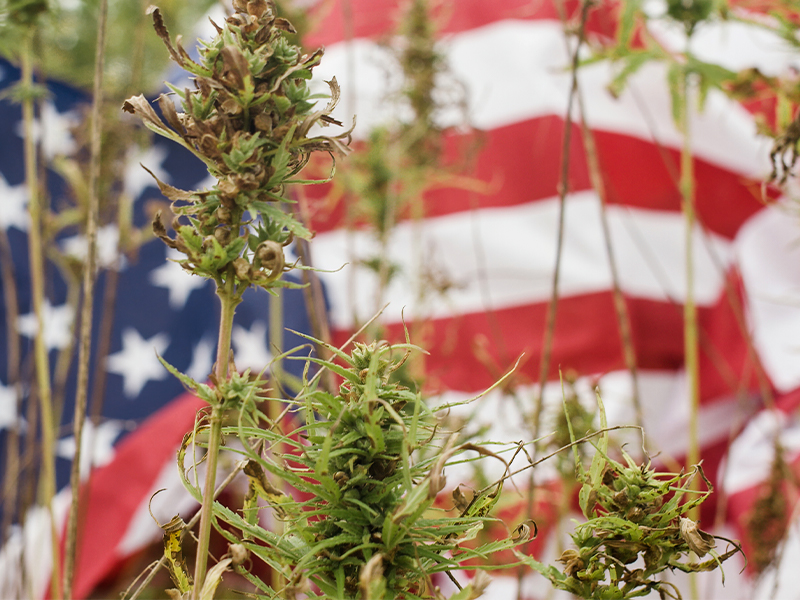Biggest Challenges for the Cannabis Industry in 2025

The U.S. cannabis industry faces five major hurdles holding back its growth, even as sales are projected to reach a record $50 billion or more in 2025.1 While a final rule due later in 2025 from the U.S. Drug Enforcement Agency (DEA) about how cannabis is scheduled looks to be a crucial moment for the sector, banking restrictions, complex regulations, market consolidation, and rising competition from established industries won’t go away, no matter what the DEA’s rule ultimately says.
Here’s what investors need to know.
KEY TAKEAWAYS
- A DEA rule due in the latter half of 2025 could immediately change how cannabis companies operate and are taxed.
- Small cannabis operators face a “survival squeeze” from both industry consolidation and new competition from major alcohol and tobacco companies.
- Despite recreational cannabis being legal in 24 states (another 16 allow medical use), cannabis companies still can’t access basic banking services, forcing many to operate primarily in cash.
Federal Rescheduling: A Turning Point for Cannabis?
The cannabis industry has been eagerly awaiting a final rule from U.S. Drug Enforcement Agency, proposed in 2024, that would reschedule cannabis from a Schedule I to Schedule III drug under the U.S. Controlled Substances Act. If the rule goes through, cannabis would no longer be categorized alongside drugs like heroin but those like Tylenol with codeine instead.
That step alone would dramatically reshape the industry’s finances. Cannabis businesses pay about double the federal tax rate of traditional companies because of IRS Code Section 280E, which prevents them from deducting normal business expenses. For example, Kansas City-based Greenlight Corporation, which operates 32 dispensaries nationwide, has said it faces an effective 50% federal tax rate compared with the standard 21% for firms in any other industry
Changing Attitudes Toward cannabis
Attitudes toward cannabis use in the U.S. have come a long, long way since the release of the iconic 1936 film “Reefer Madness”—a supposedly educational film that has become a cult classic satire. In the film, a group of high school students try cannabis and soon become deranged criminals. These days, such ideas are laughable.
More Americans have been smoking cannabis in recent years. In 2023–24, 15% of Americans reported smoking cannabis, more than double the 7% who said so in 2013. Age, gender, education, and political affiliation were all factors in the results. More than a quarter (26%) of those ages 18 to 34 reported smoking, compared to 11% of those 55 or older. Men smoked at a higher rate than women (19% vs. 14%), people with a college degree smoke less than people without them (9% vs. 21%), and more Democrats (23%) than Republicans (10%) said they smoke it.
Though cannabis smokers are in the minority overall, there is widespread support for legalization. According to a Pew Research Center survey, 88% of Americans believe the use of cannabis should be legal for medicinal or recreational use, and 59% say it should be legal for both. The U.S. The Department of Justice has proposed reclassifying cannabis from a Schedule I drug to a Schedule III drug.
Cannabis is still a Schedule I controlled drug under federal government guidelines, but the Justice Department has proposed reclassifying it as a Schedule III drug. As a Schedule III drug, cannabis would remain illegal at the federal level, but could be lawfully dispensed by prescription. In addition, restrictions on research into its benefits would be eased, as would some penalties for illegal possession.
Policy Reform
Having seen significant change at the state level, cannabis policy reform advocates are hopeful legislative change could occur on the federal level. Former President Joe Biden pardoned many cannabis-related offenses, including possession, attempted possession, and simple use. His biggest move, though, was the Department of Justice looking to reclassify cannabis to the less restrictive Schedule III category.
The passage of the SAFE Banking Act would give cannabis-related businesses a big boost. Because cannabis-related businesses are illegal under federal law, most struggle to access traditional banking and financial services, including deposit accounts and lines of credit. The SAFE Banking Act, which has drawn bipartisan support, would prohibit federal banking regulators from penalizing a bank for providing services to state-sanctioned cannabis businesses. The Senate version of the legislation is known as the SAFER Banking Act.
Under current law, banks could lose their deposit insurance for allowing cannabis companies to open accounts or borrow money, significantly affecting access to capital and the ability of cannabis businesses to process payments. The SAFE Banking Act was referred to a House subcommittee in mid-2023, and the SAFER Banking Act passed a key Senate committee in late 2023, but neither bill has yet to pass both chambers of Congress. Donald Trump, who was president before Biden, returned to office in January 2025. He has not yet expressed his stance on cannabis reform, although in the past, he has indicated support for both cannabis reclassification and the SAFE Banking Act.

The State-Federal Cannabis Legal Maze
Since legal dispensaries can’t transport products across state lines, operations in each state, even those owned by the same company, must be completely self-contained, driving up costs.
Access to Financial Institutions
Despite generating billions in sales, most banks are leery of working with cannabis companies given the legal environment. As such, most cannabis businesses are forced to run much like off-book operations, counting stacks of cash and struggling to access basic bank accounts. The problem isn’t just about deposits the steady stream of cash running through these companies creates security risks and operational headaches. Even with cannabis rescheduling, the industry would still need additional changes to federal statutes to access financial services
Problems Around Hemp
With the Farm Bill reauthorization pending, there’s significant uncertainty around the future of hemp-derived cannabinoids. This includes the legal status of intoxicating hemp-derived THC edibles that have flooded convenience stores and gas stations nationwide.
The problem?
These products often get sold with minimal oversight and compete with their highly regulated cannabis cousins. Many states have responded with a patchwork of solutions—some banning these products outright, others imposing strict testing requirements, and others leaving it up in the air about how they’ll regulate this rapidly growing market.
Market Consolidation
The industry is also facing pressures to consolidate as larger companies buy up smaller operators. Recent mergers of major operators like Cansortium with RIV Capital are part of this trend, with more in the offing.
Rising Competition from Traditional Industries
Relatedly, established alcohol, tobacco, and pharmaceutical firms, seeing the money to be made, have been quietly positioning themselves as major players in the industry. These established companies bring massive advantages: deep pockets, nationwide distribution networks, and decades of experience navigating complex regulations.
In addition, federal courts are due to rule in 2025 on lawsuits by larger cannabis companies to open up various states to more out-of-state firms. If they prevail, that would essentially open the floodgates for large national companies to enter state markets, potentially forcing out smaller regional firms that will find it hard to compete.
The cannabis industry faces significant challenges. While the proposed rescheduling of cannabis could provide some tax and legal relief, the industry will still have to navigate a complicated patchwork of state regulations, limited banking access, and increasing competition.









Leave a Reply